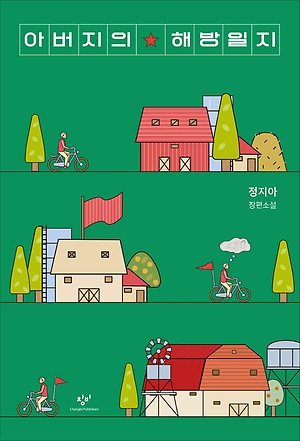
Father's Liberation Journal
Author: Jeong Ah
Publisher: Changbi
Publication Date: September 2, 2022
I didn't have any prior knowledge about Jeong Ji-ah's novel 'Father's Liberation Journal' until I ordered it. At first glance, the title of the novel reminded me of a drama I enjoyed watching recently. So, to be honest, I thought it would be as pleasant as Hideo Okuda's novels. Of course, the reason I wrote this story was because of the content of the novel, which was completely different from my poor expectations.
The novel begins with the sudden death of his father. As a young man, he acted as a partisan and his father was imprisoned after being discovered for embroidering camouflage. Such a father is a rational materialist and socialist. This father, who occasionally talks about the revolution even when he is old, is sometimes seen as an anachronistic figure. The stigma of partisan activities caused even the lives of relatives to fall into hardship due to guilt by association. Conflicts between relatives seem natural.
What kind of existence is the father to me as a daughter? He appears to be self-righteous, and at times stubborn. To her daughter, her father is just a father, and he is a stigmatized partisan who fell for socialism in his 20s. That's why he couldn't even marry a man he'd known for a long time since college. It is because it is difficult to live properly in this world with a leftist career.
Would her daughter hate her father? not. I don't think she hated it, but it's no wonder her life was hard. So, the resulting fatigue may be accumulated. Wouldn't his father be like a remnant of a failed political idea? At his funeral, he encounters his father's ties that he did not know. And in it, I think about my father again. I've been thinking Was the father simply a failure?
Whether it's communism or socialism, if you look at its content, it's a political slogan to find a way for us to live like human beings. When we face the absurdity of reality and think that it can be solved through effort or passion, we take action. In that era, such confrontation developed sharply and violently. However, even if such a political slogan did not materialize in the end, we would not call it a mere failure. Shouldn't it be said that it is meaningful because at least an effort was made for change?
In the wake of her father's death, the daughter sees a side of her father she did not know. She feels that she is in touch with herself. Just a failed socialist, a failed partisan... The simple way of looking at the father changes. She would have felt that she was a daughter. The three-dimensional figure of the father. It means that we cannot judge everything from the dichotomy of good and evil. Although they were confrontational, they acknowledged each other in their own way.
How many twists and turns have there been in our modern and contemporary history? However, now we must not fight by dividing sides. This means that the past should not be viewed only from a dichotomous perspective. Perhaps what we need is a sense of balance, a spell to look at the past more three-dimensionally.